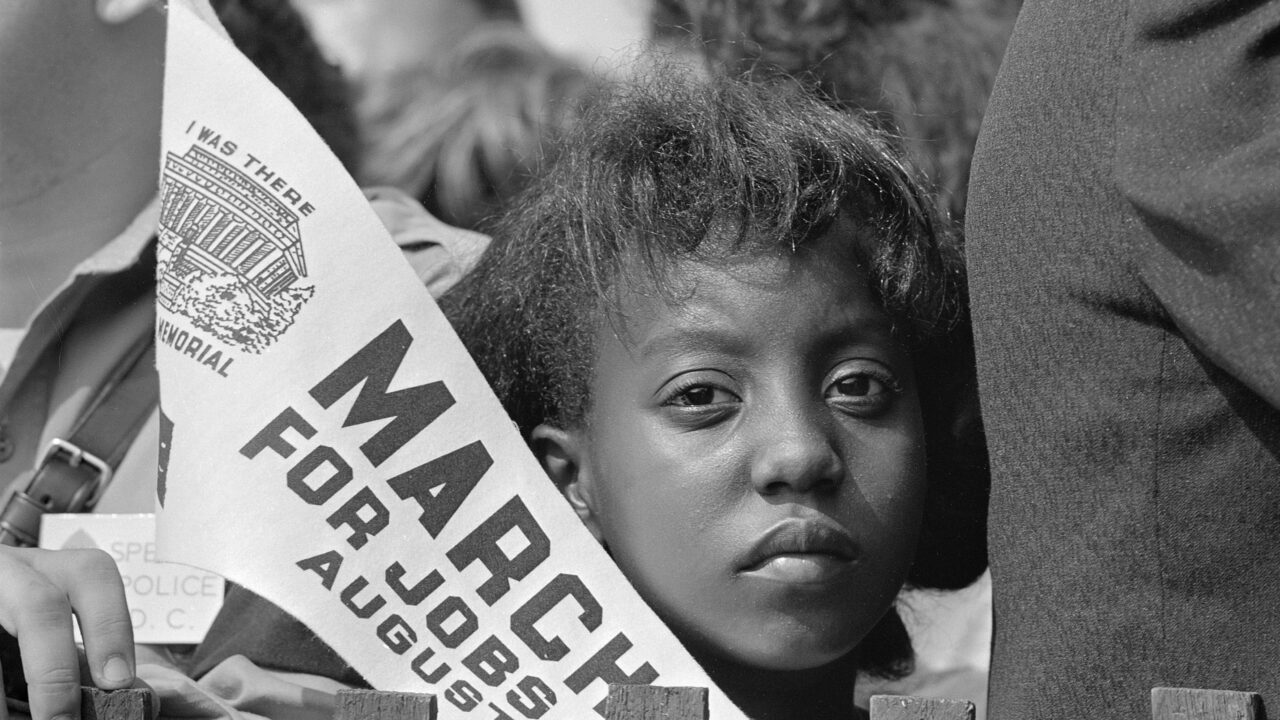The following is a lightly edited transcript of opening remarks by Andrea J. Ritchie for the Abolitionist Gathering at the 2022 Allied Media Conference. It is an assessment of the current conditions in which the abolitionist movement exists and some of the difficult questions concerning power and strategy that must be faced in the coming years.
This assessment is based on over 35 years of organizing and advocacy through a Black queer feminist abolitionist lens around police, state, and gender-based violence in movements for racial, gender, reproductive, migrant justice, and labor organizing as a Black lesbian migrant and survivor of police and interpersonal violence who has participated in several local and national abolitionist formations, including INCITE! It is also based on learning from and with many of you through the weekly Invest/Divest Learning Communities I’ve hosted since May 2020 and the 2021 Defund Fellowship hosted by the Community Resource Hub, and the spaces and conversations convened and supported by IC [Interrupting Criminalization], including the Cities Initiative cohort, Beyond Do No Harm Network, and Building Coordinated Crisis Response learning space, the In Our Names Network – a network of over 20 organizations working to end police violence against Black women, girls, trans and GNC people – and my involvement in Black Organizing for Leadership and Dignity.
Over the past 2 years we built power by seizing on a moment of crisis to advance bold, abolitionist demands and visions focused on:
- Defunding, divesting from, and dismantling violent police departments and jails
- Funding the things our communities need to survive the pandemic, economic, and climate crises and to reduce violence and harm,
- Challenging policing in all forms, including through family policing, medical policing, migrant policing, etc.
We built power by:
- Building and deepening relationships in community through mutual aid, community surveys and participatory research, political education, and other ways of creatively creating opportunities for conversations about what safety means and looks like;
- Increasing our collective knowledge and understanding of municipal budgets and processes;
- Seizing greater control of our collective resources through public safety task forces, participatory budgeting and progressive revenue generation, and processes governing disbursement of American Rescue Plan Act (ARPA) funds;
- Connecting through national translocal networks and spaces like this one, the Cities Cohort supported by IC, Community Resource Hub Learning Communities & Defund Fellowships, and others, in which we learned from each other, sharing and strengthening strategies, skills, resources, tools, space, community, and visions.
We forced policymakers to:
- Contend with our demands;
- Justify police budgets that had previously been passed largely without any justification at all;
- Attempt to absorb and co-opt our demands;
- Mount a massive public relations campaign to delegitimize our demands and visions and re-legitimize police.
Those are signs of the power, not weakness, of our vision and message. We shifted the national conversation, making a significant impact on undermining the conventional wisdom that policing = safety.
We were able to translate that power into some material changes – almost $1B out of police budgets in 2020, and increased investments in violence prevention and interruption, crisis response, housing, guaranteed income, and more.
Despite these significant victories, when nationwide protests subsided, our power to make our demands and recommendations real was limited by our lack of capacity to move past mobilization to building a base by absorbing newly politicized and mobilized people into organizations and political formations, and keeping folks engaged in the hard work of building toward abolition for the long haul. Perhaps even more importantly, our power to make our demands and recommendations real was limited by a lack of political alignment around what abolitionist organizing requires and looks like, particularly in terms of policy reform and police accountability. Defund means shifting power, resources, and legitimacy away from police, always, absolutely. That was a hard shift for many to make – even for some abolitionists who had been focused on policymaking as harm reduction.
We need to be vigilant about policy solutions that misapprehend what police are – which is part of the reason IC created the So Is This Actually an Abolitionist Proposal or Strategy? binder you received. Lack of alignment around the commitments inherent in an abolitionist politic led organizers to fall prey to pitfalls of:
- Calling for prosecutions of police officers, DOJ investigations, or the creation of registries of “bad” police officers and departments,
- Engaging fights around police contract provisions and civil litigation doctrines like qualified immunity that focus solely on after the fact investigatory processes and consequences for police violence,
- Focusing solely on “transparency” bills, bans on no knock warrants and chokeholds and other tweaks to “use of force” policies, etc. which, without more, will not produce material changes in how policing takes place.
Even as we envisioned and called for “alternatives” to police, we focused on on meeting moments of crisis (creating non-police crisis response teams, civilian traffic enforcement, etc) with things that looked strikingly like police, or that tie back into criminalizing processes and carceral systems, instead of preventing crises and challenging the process of criminalization altogether.
Lack of political alignment, long term strategies and visions, and of strong political containers to move us toward those visions also fueled internal conflict, which was compounded by exhaustion and a lack of skills to navigate power inside our organizations and movements.
Many formations that sprang up or grew exponentially in the context of the Uprisings focused primarily on messaging over base-building – a trend philanthropy is exacerbating in the current context by divesting from organizing and shifting its focus to “narrative change.” It is disorganizing to eviscerate “narrative change” work from the slow, hard, daily work of organizing, meeting people’s needs, and engaging in deep political education, skill and relationship building. Yes, organizing is about shaping people’s understanding of their conditions and the world around them. It’s a process of sensemaking – shifting the “common sense.” It does require us to tell different stories about current conditions and the vision we are working towards – but not in the abstract. Narrative shift must happen in the context of building relationships and power. It’s not about coming up with some magical combination of words that will somehow persuade the police state to dismantle itself, a phrase or message that will sit well with liberals or centrists, or simply throwing “messaging” out into the void in a carefully crafted opinion piece published in a national paper of record or brilliantly worded billboard.
These are some of the realities that prompted IC to collaborate with our co-hosts to put together this gathering and to invest in skill building & collective development of a long term strategy.
Ultimately, the past two years have forced us to confront how we contend with power, and to grapple with our relationship to the state. As our defund demands have evolved, we have had to ask ourselves, at a basic level:
- Are we demanding to move money to state entities like public housing, public hospitals, public benefits programs, etc., or to community-based programs? If the latter, how do we guard against community-based programs becoming extensions of the carceral state?
- How do we understand and resist policing, and the ways it operates through all arms of the carceral state, including those that distribute benefits and resources, and in our community organizations and programs?
- Are we willing to engage with the state by meeting with councilmembers, participating in public task forces, etc? Are we valuing political purity over making strategic moves based on our political analysis and power mapping?
These questions in turn point us to bigger ones: are we trying to capture and repurpose the carceral state or dismantle it? What forms of governance do we imagine will bring us closer to abolitionist futures? How are we practicing and building them as we struggle?
- Are we trying to seize the carceral state by electing officials who will move our agendas while misunderstanding the structures in which they operate and our relationships with politicians as power? How did this contribute to politicians backsliding once power of the streets lessened and political winds changed?
- Should we be working to create departments to promote and fund “anti-carceral” services within a carceral state – in other words, to reshape it from within?
- Is it consistent with an abolitionist politic to attempt to exercise “community control” of police?
- What functions do/can/do we want states to perform? Is it possible to separate policing out of any of these functions?
- Is an anti-capitalist non-carceral state even possible? Or is it, as Dean Spade asks, are nation-states a “technology of extraction” that inherently engage in policing by sorting populations and distributing resources and life chances within policed borders? Are nation-states, as Robyn Maynard and Leanne Betamosake Simpson argue, inherently structures of displacement of Indigenous peoples and anti-Blackness? What can we learn from Indigenous conceptions and practices of nations beyond states?
- How are we confronting capitalism? It is not possible, as some have suggested, to be capitalist and abolitionist – how are we making our abolitionist organizing anti-capitalist?
So my responses to the theme of this panel – what time is it on the clock of abolitionist organizing? – focus on the following questions:
- Where can we contest for power? How can we mobilize a dual power framework to wrest resources from the state and practice new social relations and modes of governance beyond the state without getting caught up in electoral/co-governance models?
- What can we do now that creates more conditions of possibility to imagine and transition to new forms of governance that bring us closer to abolitionist futures?
- How do we navigate the carceral state in the meantime?
- How can we meet what is to come/already here? How are we connecting across movements and translocally to build power, skills, relationships and structures to resist state repression and white supremacist violence, reduce sufferingm and ensure the survival of the greatest number of people we care about through what is to come?
We look forward to grappling with and collectively building our analysis and practice around these questions with all of you here over the next couple of days and beyond. [ed. Many of these questions and more are gathered in IC’s Abolition and the State Discussion Tool]

